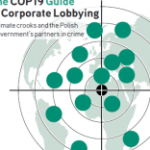Published by Corporate Europe Observatory, CEO, 21 November 2013.
Nieszczescia chodza parami – wielcy truciciele, polski rzad i ONZ
Corporate Europe Observatory
we wspolpracy badawczej z Karolina Jankowska
Goszczenie tegorocznej Konferencji Narodow Zjednoczonych nt. Zmian Klimatu, COP19, przez Polske, kraj w duzej mierze uzalezniony od wegla i cieszAcy sie zla slawa blokujacego ambitna polityke klimatyczna na poziomie UE, nie wrozy nic dobrego dla jej rezultatow. Polski rzad zaprosil prywatne korporacje do sponsorowania COP – choc przede wszystkim na konferencje, co wywolalo fale pytan, czy COP jest nadal powaznym miedzynarodowym spotkaniem najwyzszej wagi, czy tez znakomita szansa do lobbowania przez tych, ktorzy maja bezposredni komercyjny interes w spalaniu wiekszej ilosci paliw kopalnych. Fakt, ze jeden ze sponsorow biznesowych, producent stali ArcelorMittal, zaplacil za budowe pomieszczen konferencyjnych i umiescil na nich swoje logo, jest znamienitym symbolem “zawlaszczenia” (capture) przez korporacje procesu negocjacyjnego COP.
W miedzyczasie odbyl sie Miedzynarodowy Szczyt Wegla i Klimatu (International Coal and Climate Summit), zorganizowany przez Swiatowa Organizacje Wegla (World Coal Association) jako wydarzenie rownolegle, przy wsparciu polskiego Ministra Gospodarki. Wspolnie wydali oni tzw. “Komunikat Warszawski” (“Warsaw Communique”) proponujac wykorzystanie nieistniejAcego w rzeczywistosci “czystego wegla” (“clean coal”) do walki ze zmianami klimatu.

